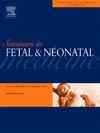Overview of reproductive and pregnancy health principles and practice used by maternal-fetal medicine specialists for fetal-neonatal neurology consultants
IF 2.9
3区 医学
Q1 PEDIATRICS
引用次数: 0
Abstract
Unique from other fetal anatomical systems, the central nervous system (CNS) starts development early in the embryonic period shortly after fertilization before most patients are even aware they are pregnant. Maturation throughout pregnancy involve complicated structural and functional changes, most likely below the resolution of testing to detect. During this time, the fetal CNS is susceptible to lesions that reflect trimester-specific adverse events.
Neonatal neurological status with childhood sequelae can result from combinations of antenatal, peripartum and neonatal adverse events. Person-specific clinical management choices must consider the timing of multiple mechanisms that can alter neurodevelopment including genetic causes, aetiologies after conception as well as communicable and non-communicable conditions that result in anomalous or destructive brain lesions. The appearance of the fetal brain also changes significantly through gestation as different structures mature and the cerebral cortex in particular increases in size and complexity. Therefore, obstetrical imagers and maternal fetal medicine physicians need to be aware of the expected evolving appearances of the healthy fetal brain as the fetus advances in gestation.
Often when fetal CNS pathology is detected or anticipated during pregnancy, there is understandably significant parental anxiety regarding the long-term implications of their child's neurodevelopmental prognosis. In these instances, Maternal Fetal Medicine specialists often collaborate with Pediatric Neurologists in the antenatal period regarding diagnoses that anticipate neonatal or later childhood neurologic sequelae. Potential adverse outcomes are discussed with prospective parents to be integrated into choices based on shared decisions.
母胎医学专家为胎儿新生儿神经科顾问提供的生殖和孕期保健原则及实践概述。
与其他胎儿解剖系统不同,中枢神经系统(CNS)在受精后不久的胚胎期就开始发育,而大多数患者甚至还没有意识到自己已经怀孕。整个妊娠期的成熟涉及复杂的结构和功能变化,很可能低于检测分辨率。在此期间,胎儿的中枢神经系统很容易发生病变,这些病变反映了特定孕期的不良事件。产前、围产期和新生儿期不良事件的综合作用可导致新生儿神经系统状况不佳并伴有儿童后遗症。针对不同个体的临床治疗选择必须考虑多种机制改变神经发育的时间,包括遗传原因、受孕后的病因以及导致异常或破坏性脑损伤的传染性和非传染性疾病。胎儿大脑的外观在妊娠期间也会随着不同结构的成熟而发生显著变化,尤其是大脑皮层的大小和复杂程度会增加。因此,产科成像师和孕产妇胎儿医学医师需要了解健康胎儿大脑在妊娠期的预期外观变化。通常情况下,如果在孕期发现或预计到胎儿中枢神经系统病变,父母会对孩子神经发育预后的长期影响感到焦虑,这是可以理解的。在这种情况下,母胎医学专家通常会在产前与小儿神经科专家合作,共同诊断新生儿或日后儿童神经系统后遗症。他们会与未来的父母讨论潜在的不良后果,并在共同决定的基础上做出选择。
本文章由计算机程序翻译,如有差异,请以英文原文为准。
求助全文
约1分钟内获得全文
求助全文
来源期刊
CiteScore
6.40
自引率
3.30%
发文量
49
审稿时长
6-12 weeks
期刊介绍:
Seminars in Fetal & Neonatal Medicine (formerly Seminars in Neonatology) is a bi-monthly journal which publishes topic-based issues, including current ''Hot Topics'' on the latest advances in fetal and neonatal medicine. The Journal is of interest to obstetricians and maternal-fetal medicine specialists.
The Journal commissions review-based content covering current clinical opinion on the care and treatment of the pregnant patient and the neonate and draws on the necessary specialist knowledge, including that of the pediatric pulmonologist, the pediatric infectious disease specialist, the surgeon, as well as the general pediatrician and obstetrician.
Each topic-based issue is edited by an authority in their field and contains 8-10 articles.
Seminars in Fetal & Neonatal Medicine provides:
• Coverage of major developments in neonatal care;
• Value to practising neonatologists, consultant and trainee pediatricians, obstetricians, midwives and fetal medicine specialists wishing to extend their knowledge in this field;
• Up-to-date information in an attractive and relevant format.

 求助内容:
求助内容: 应助结果提醒方式:
应助结果提醒方式:


